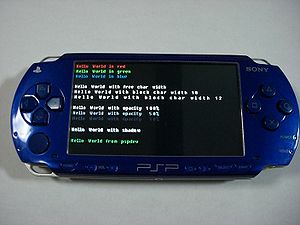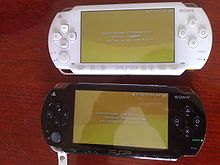- PlayStation Portable homebrew
-
PlayStation Portable homebrew refers to the process of using exploits and hacks to execute unsigned code on the PlayStation Portable (PSP).
Contents
History of homebrew
Soon after the PSP was released, hackers began to discover exploits in the PSP that could be used to run unsigned code on the device. Sony released version 1.51 of the PSP firmware in May 2005 to plug the holes that hackers were using to gain access to the device.[1] On 15 June 2005 the hackers distributed the cracked code of the PSP on the internet. Hackers refused to apply updates which would render their hacks unusable so Sony attempted to convince users that there was a benefit to upgrading by including new features in the firmware updates, such as a web browser, and not just security patches to plug the vulnerabilities. BusinessWeek dubbed this the "carrot-and-stick" approach.[2]
In August 2005 Sony released version 2.0 of the firmware which included the web browser, file compatibility updates and other features.[3] Hackers and other homebrew enthusiasts then encountered the first trojan for the PSP. Symantec called this trojan "Trojan.PSPBrick". Users attempting to downgrade their PSP using this software instead found that it was rendered inoperable as this software deleted mandatory/important system files.[4] Over the course of 2005 Sony released six different versions of the firmware and hackers typically responded to it by downgrading to avoid the new security updates.[2]
In Mid-2006, after several months of problems in defeating the PSP's firmware a file was posted online which allowed new PSPs running firmware version 2.6 to downgrade to 1.5 so they could then be hacked using older methods. This reportedly caused more buzz in the community than any recent official offerings for the device.[5]
Dark_AleX
Dark AleX (aka Dark_AleX, Dax) is a Spanish programmer who writes homebrew applications for the PlayStation Portable. Dark AleX, as well as other variations of the name, is a pseudonym under which he works. [6] One of the drawbacks of downgrading the PSP is that new official media may require the presence of a new firmware edition. Dark_Alex had released a custom firmware called "Dark Alex's Open Edition firmware" or "Custom Firmware (CFW)" which opens the firmware but allows users to use the existing feature set of the current edition. Sony quickly patched the firmware again, continuing the cat-and-mouse game with the hackers and users.[7] In 2006 Sony released six updates to the system firmware and in 2007 they released another six updates.[3] In July 2007 Dark_AleX officially stopped his work on the PSP, citing perceived problems with Sony as one of the reasons for his departure.[8] Some people even suggested that Dark_AleX was paid by Sony not to release any more custom firmware, but Sony denied this.[9]
Custom Firmware allows the running of unsigned code such as homebrew applications and UMD backups, emulators for other consoles, as well as PlayStation games when the disc images are converted into PSP format.[10]
Motivation for homebrew
Hackers have stated that the motivation for unlocking the PSP has nothing to do with piracy, but allowing individuals full access to the products they've purchased and the freedom to do what they want with the item as well as the interest in exploring something unknown.[2][11] Fanjita, a member of the hacker group "N00bz!", stated,
"Everyone has the right to do what they want with their own hardware. Piracy does upset me, and because what we are doing opens the way to piracy it's harder to justify it morally. But our stance on piracy is clear, and we hope to be role models. Sony have never been in touch with me, so I am confident that what we are doing is legal."[7]
Additional features added including the ability to emulate and play the ROMs of other consoles, play homebrew games, share music, print photos, watch videos from streaming sites such as YouTube, and run additional video formats originally unsupported by the device.[2]
Sony's position
Sony has told the media that any issues resulting from running modified code on the device would void the warranty.[1][2] They have also stated that the problem is not with homebrew but piracy.[7] However their constant firmware updates are seen as attempts to hamper homebrew development.[12] According to Phillip Torrone from Make Magazine, this hampering could be due to the attempts to curb piracy and may cause more harm than good.[11]
"I think the really smart companies should release their products to the alpha geeks for six months and let the alpha geeks play around with them. It seems to me they'd save a lot of money on R&D, and they'd come out with much more solid products."
However, Sony has also said that, when questioned about homebrew game support, Jack Tretton replied with,
"I think that is something that is in the works. We certainly see some of the stuff that has been done via homebrew, and it's incredibly creative. And I think we'd like to try and tap into that a little bit more."[13]
References
- ^ a b "Sony battles hackers over hijacked games". Reuters. 2005-07-06. http://www.redorbit.com/news/display/?id=166043&source=r_scifi_gaming. Retrieved 2008-12-02.
- ^ a b c d e Kenji Hall (2005-12-01). "Attack of the Playstation Hackers". BusinessWeek. http://www.businessweek.com/technology/content/dec2005/tc20051230_356459.htm. Retrieved 2008-07-21.
- ^ a b "Playstation.com - Support - System Updates - psp". http://www.us.playstation.com/support/systemupdates/psp/history.html.
- ^ Robert McMillan (2005-10-08). "Trojan Trashes Playstation Portable". PC World. http://www.pcworld.com/article/122915/trojan_trashes_playstation_portable.html. Retrieved 2008-07-22.
- ^ Mike Musgrove (2006-06-06). "Routine Upgrades Are the Bane of 'Homebrew' Enthusiasts". The Washington Post. http://www.washingtonpost.com/wp-dyn/content/article/2006/07/05/AR2006070501627.html. Retrieved 2008-07-28.
- ^ Rubens, Paul (2007-02-26). "Three hacker teams unlock the PSP". BBC News. http://news.bbc.co.uk/1/hi/technology/6397797.stm. Retrieved 2008-02-17.
- ^ a b c Paul Rubens (2007-02-26). "Three hacker teams unlock the PSP". BBC. http://news.bbc.co.uk/2/hi/technology/6397797.stm#chart. Retrieved 2008-07-21.
- ^ Patel, Nilay. "PSP modder extraordinare Dark_AleX calls it quits". engadget. http://www.engadget.com/2007/07/03/psp-modder-extraordinare-dark-alex-calls-it-quits. Retrieved 2008-08-05.
- ^ Totilo, Stephen. "Sony Exec Talks New PSP's Upgrades, GPS Attachment, NYC Appeal And More". MTV. http://www.mtv.com/news/articles/1566451/20070806/index.jhtml. Retrieved 2008-08-05.
- ^ Swann, Graham. "Investigating the PSP's PSone emulator". Eurogamer. http://www.eurogamer.net/article.php?article_id=72468. Retrieved 2008-08-05.
- ^ a b Mike Musgrove (2005-07-12). "Tapping into Tinkering". The Washington Post. http://www.washingtonpost.com/wp-dyn/content/article/2005/07/11/AR2005071101638_2.html. Retrieved 2008-07-@22.
- ^ Gregory A. Quirk (2007-11-20). "Under the Hood: Sony Playstation Portable slims down". EETimes. http://www.eetimes.com/news/semi/showArticle.jhtml?articleID=204200248. Retrieved 2008-07-22.
- ^ Greg Miller (2007-07-23). "Mailbag for 23 July 2007 - The Small Fish". IGN. http://psp.ign.com/mail/2007-07-23.html. Retrieved 2008-12-24.
Categories:- PlayStation Portable
- Homebrew software
Wikimedia Foundation. 2010.


